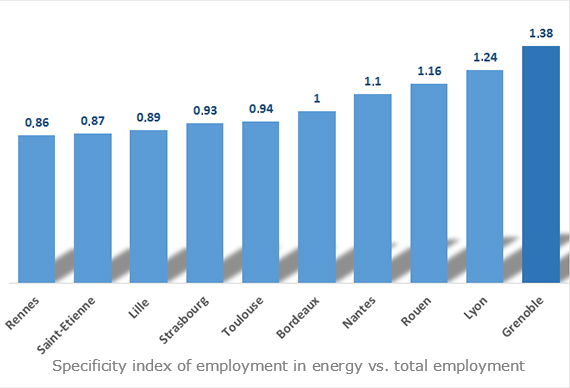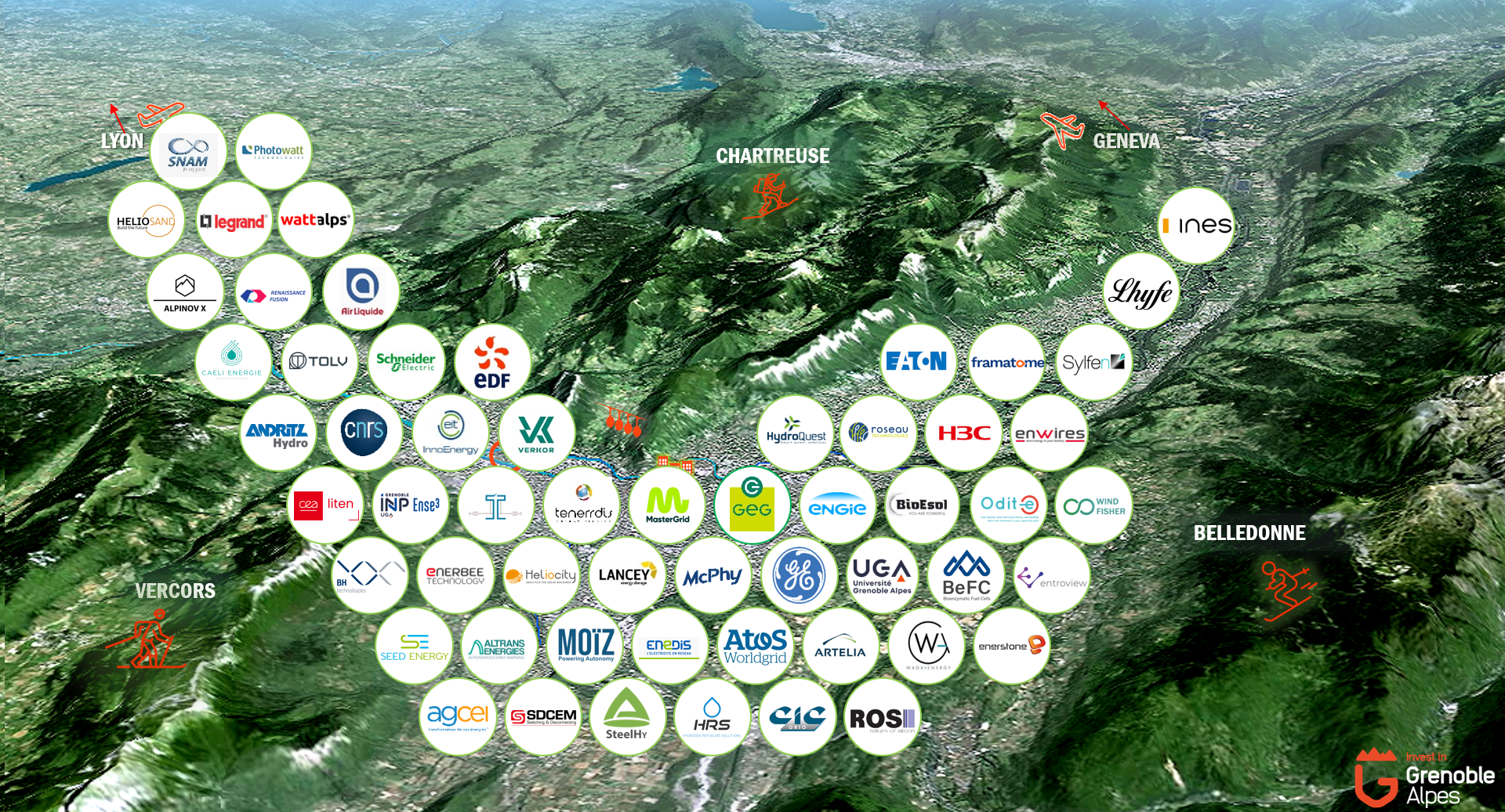COMMITTED TO THE DEVELOPMENT OF
SUSTAINABLE ENERGY TECHNOLOGIES
The invention of hydroelectricity in 1870 by Aristide Bergès led to significant growth of Grenoble’s manufacturing sector. Today, with 38 hydroelectric power plants, Grenoble Alpes’ surrounding area continues to be France’s leading territory for hydroelectricity.
But this was just the starting point for what has become a lively energy sector in Grenoble Alpes. Both the public and private sectors are invested in the development of new green technologies, like hydrogen fuel cells, batteries and biogases, as well as experimentation with new public policies, like the methanization of organic waste and the expansion of district heating. These technologies touch all realms of life – mobility, heating, electricity, and more.
Today, the energy sector includes over 17,000 jobs (15,000 in industry and 2,000 in R&D), which are all concentrated within a radius of 20km.
For decades, Grenoble Alpes’ greater Metropolitan area has been dedicated to addressing the challenges associated with the energy transition and has committed itself to the development of renewable energies.
In 2005, Grenoble made history, becoming the first metropolitan area in France to officially adopt a climate plan and in 2022, the city was named Europe’s Green Capital based on the Metropolitan area’s numerous commitments to the green transition.
These landmarks have only furthered the resolve of Grenoble Alpes’ public and private sectors to develop energy solutions that live up to the challenges facing the planet.
Today, hydroelectricity remains a vital part of the local economy. Energy leader, EDF, employs 1,200 people at their Alpes Hydro production sites. Additionally, the company’s largest training center for professionals in the hydroelectricity sector is located in Grenoble’s Metropolitan area.
Grenoble Alpes has also been recognized as a leader for the development of new hydrogen technologies. Air Liquide is the largest and most well-known actor in this domain to have a significant presence in Grenoble Alpes. The company counts over 1,000 employees in the area, and has continued to invest in local infrastructure, recently completing the renovation & expansion of its largest innovation center in France, “Campus Innovation Grenoble”.
A diversity of newer and innovative SMEs has joined the hydrogen landscape, like HRS or Inocel. Many of these small companies and startups have looked to make hydrogen technologies not only viable, but also economically competitive alternatives in a post-carbon world.
Similarly, battery technologies have become an important part of the area’s energy landscape. With record fundraising, battery startup Verkor jumped onto the scene in 2020. Their quick launch and growth is evidence of the unique ingredients present in Grenoble for this particular field – excellence in the science and engineering of materials, chemistry, physics, electronics and energy. The company is projected to be one of Europe’s major EV battery producers in the coming years. Verkor is joined by several startups and small companies working in battery technologies, such as WattAlps, Limatech, Enwires, Enerstone, Phoenix Mobility & PowerUp.
The city has also been a vector for the development of smart grid & energy hub technologies. One of the key actors in this field, historically, has been Schneider Electric, company that was founded in Grenoble Alpes. As a global leader in energy management, Schneider Electric has maintained a significant presence in the region, employing over 5 000 people in Grenoble Alpes, with one of its three strategic R&D centers still located in Grenoble (the two others in Shanghai and Boston).
Grenoble Alpes benefits from the presence of several other actors that participate in energy distribution and the deployment of a “smarter grid” include Enedis, Odit-E, Mastergrid, GEG & EDF.
There are also numerous digital actors have also joined the sector like French digital leader, Atos, which established the headquarters of its “Worldgrid” subsidiary in Grenoble. Other private-sector actors that participate in digital smartgrid management include BHTechnologies, Capgemini, and Probayes.
Underpinning this entire energy network are academic actors, like the Université Grenoble Alpes, with its Environment, Water & Energy engineering school, ENSE3 and its G2E lab, which forms electrical and environmental engineers. The sector Is also buttressed by public and semi-public R&D centers, like the CEA Liten, INRIA and the CNRS. These three actors drive technology transfer in numerous energy fields.
Finally, Grenoble Alpes is home to multiple competitive business clusters. One such is Tenerrdis, which represents actors working towards the energy transition. Another, Minalogic, deals with digital technologies and companies working in smart grid technologies.
With a higher concentration of jobs in the energy sector than any other Metropolitan area in France, Grenoble’s research community is involved in the development of the majority of technologies linked to renewable energies/
x Smart grids
x Energy efficiency and smart buildings
x Fuel cells and Hydrogen
x Batteries and Energy Storage
x Hydroelectricity
x Photovoltaics
x Biomass

KEY STAKEHOLDERS
Large Multi-nationals:
x Schneider Electric
x EDF
x Air Liquide
x Enedis
x Siemens
x Verkor
x GE Vernova
x Photowatt
x Artélia
x Eaton
x Andritz
SMEs & Startups:
x Enerbee
x Finoptim
x Gulplug
x Hydroquest
x Lancey Energy Storage
x Limatech
x Renaissance Fusion
x Roseau Technologies
x Stellaria
x Wattalps
x HRS
x Enwires
x Waga Energy
etc ..
x CEA-Liten (Lab for Innovations in New Energy Technologies and Nanomaterials) is the largest European research center working on new energy technologies. It has numerous technical platforms in Grenoble that are designed to allow for close collaborations with industry partners. The platforms include: biomass, solar photovoltaics, smart grids, hydrogen production and storage, batteries, fuel cells, electromobility, energy microsources, thermal systems, and powder metallurgy.
x The Institut Néel and LEPMI bring together a diversity of skills in the field of electrochemistry
x G2Elab is a laboratory that covers a broad range of capabilities in electrical engineering research. Internationally, it is recognized as a major actor in the field of electrical energy as well as in materials, innovative processes, systems & modeling, and design.
x Grenoble-INP Ense3, Engineering school dedicated to energy. The 3 in its name stands for: water, energy and environment.
x Grenoble Alpes Université, #1 in France in the Shanghai ranking in several domains: energy science, water resources engineering, computer science & engineering, electrical & electronic engineering, nanoscience & nanotechnology et – instruments science & technology.
x The EDF training center opened in 2019, hosts up to 3,500 trainees per year. It is EDF’s main hydraulics training center in France. The training center is also open to outside companies.
x Tenerrdis is a competitive business cluster dedicated to the energy transition. Based in Grenoble, it is an integral part of the energy community and maintains close relationships with a network of French and European energy actors. The group brings together 223 members (70% of which SMEs & startups), has provided support for over 750 projects & certified demonstrators, and has financed 320 projects & demonstrators as part of its 7 sectors of expertise (€1.8 billion in R&D spending).
x Innoenergy, with its only French office located in Grenoble, companies and startups in the energy sector who are members of Innoenergy benefit from a complete support program: incubation, investment, commercial & technical support, research of European partners, and more…
x EDF une Rivière un Territoire (One River, One Land) Agency, particularly committed to local development and the industrial appeal of Grenoble Alpes, this organization helps companies in the Metropolitan area and major actors in the sector, in order to support structuring actions in the domain in the region.
x Hydro 21 is an association dedicated to bringing together the region’s capabilities in hydraulics and hydroelectricity. The association includes major industry stakeholders, engineering companies, academic labs and training centers. It also organizes the annual “Business Hydro” event that takes place in Grenoble.

FOR MORE INFORMATION ABOUT
THIS ACTIVITY
MAJOR INDUSTRIES
With over 75,000 jobs in the private sector and a high concentration of established industry leaders, Grenoble Alpes has been attracting businesses and talents from around the world for decades. The city stands out in a number of domains thanks to its dynamic startups (among the most innovative in France), its local university (ranked among the world’s top 150 universities), and its collection of cutting-edge laboratories and international research centers, which span all types of research, from fundamental to applied.
With over 75,000 jobs in the private sector and a high concentration of established industry leaders, Grenoble Alpes has been attracting businesses and talents from around the world for decades. The city stands out in a number of domains thanks to its dynamic startups (among the most innovative in France), its local university (ranked among the world’s top 150 universities), and its collection of cutting-edge laboratories and international research centers, which span all types of research, from fundamental to applied.

